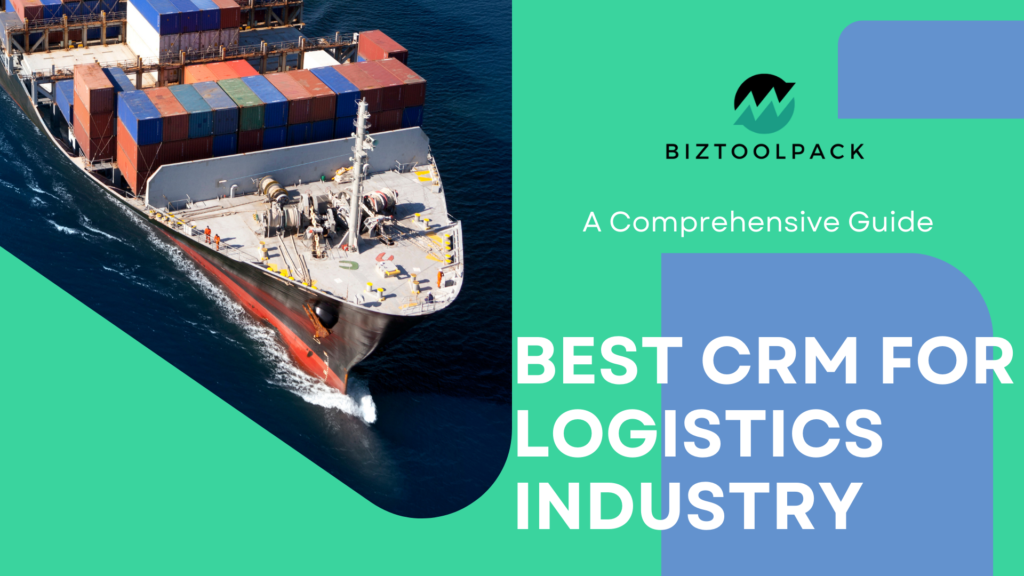As businesses navigate the complexities of the modern marketplace, effective customer relationship management (CRM) has become indispensable. For the logistics industry, where efficiency, customer satisfaction, and seamless operations are paramount, selecting the right CRM can make all the difference. In this comprehensive guide, we’ll explore the best CRM solutions tailored specifically for the logistics sector, helping you make an informed decision that drives your business forward.
Did you know that businesses using a CRM system experience a 29% increase in sales?
Introduction
In today’s fast-paced logistics landscape, managing customer relationships effectively is no longer a luxury—it’s a necessity. Did you know that businesses using a CRM system experience a 29% increase in sales? This statistic underscores the transformative impact a robust CRM can have on your operations, customer satisfaction, and overall profitability.
The objective of this article is to provide a detailed comparison of the top CRM solutions tailored for the logistics industry. Whether you’re a small logistics firm or a large-scale operation, selecting the right CRM can streamline your processes, enhance customer interactions, and ultimately boost your bottom line.
Choosing the right CRM is pivotal for achieving business success in the logistics sector. A well-implemented CRM system can enhance customer retention by providing personalized experiences, streamline operations by automating routine tasks, and offer valuable insights through data analytics. In an industry where timely delivery and efficient management are crucial, a CRM system ensures that you stay ahead of the competition.
In this article, we will cover:
- Key features to look for in a CRM tailored for logistics
- A detailed comparison of the top 6 CRM solutions for the logistics industry
- Recommendations based on different business needs
- A step-by-step guide for beginners to choose the right CRM
- Frequently asked questions to address common concerns
What to Look for in a CRM for Your Business
Scalability
In the logistics industry, growth is a constant goal. Your CRM should be able to scale alongside your business, accommodating increasing data volumes, user numbers, and expanding operational complexities. A scalable CRM ensures that as your business grows, your customer relationship management remains robust and efficient without the need for frequent system overhauls.
Ease of Use
An intuitive interface and a straightforward onboarding process are essential, especially for small teams or those new to CRM systems. A user-friendly CRM minimizes the learning curve, ensuring that your team can quickly adopt and utilize the system effectively. Features like drag-and-drop functionality, customizable dashboards, and comprehensive training resources contribute to ease of use.
Customization
Every logistics business has unique workflows and requirements. A customizable CRM allows you to tailor the system to fit your specific needs, whether it’s integrating with existing software, customizing data fields, or automating specific processes. Flexibility in customization ensures that the CRM supports your business operations seamlessly, rather than forcing you to adapt to rigid software structures.
6 Best CRM Solutions for Logistics Industry
Choosing the right CRM can be daunting with numerous options available. Here are six top CRM solutions that stand out for the logistics industry:
1. Keap CRM
Keap is a CRM and marketing automation tool designed to help small businesses streamline their sales, customer service, and marketing processes. With its focus on automation, Keap enables logistics companies to efficiently manage client relationships, track leads, and automate follow-ups, making it a great fit for growing businesses.
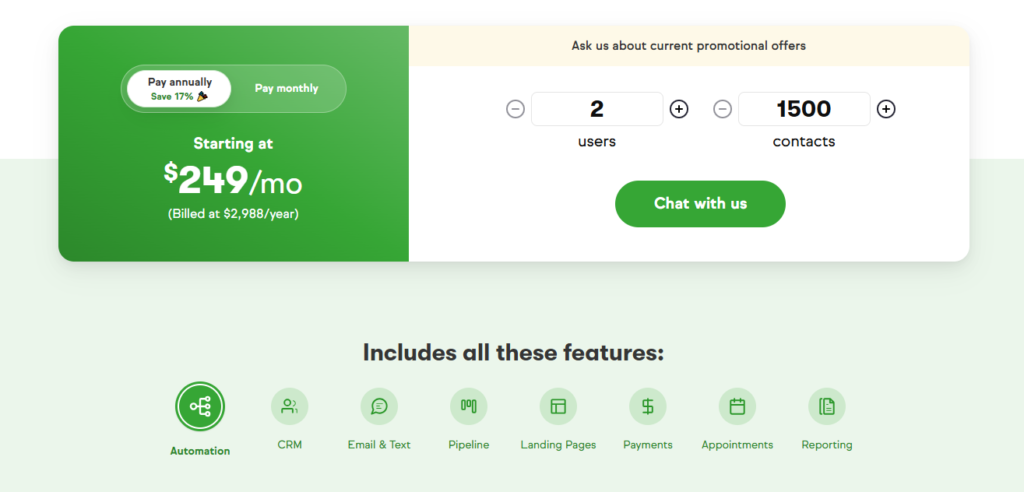
Key Features:
- Marketing and Sales Automation: Automates repetitive tasks like follow-up emails, appointment scheduling, and invoicing, helping logistics companies stay on top of customer interactions without manual effort.
- Lead Management: Helps logistics teams capture, organize, and manage leads, ensuring potential business opportunities are never missed.
- Customizable Pipelines: Tailor sales pipelines to match the logistics sales process, allowing teams to track deals and contracts from prospecting to closure.
- Integrated Payments: Simplifies invoicing and payment collection, streamlining the financial side of logistics operations.
- Client Management: Provides a centralized database to manage contacts, track communications, and monitor service delivery status.
Pricing:
- Pro Plan: $249/month for 1,500 contacts and 2 users.
- Max Plan: Starts at $349/month for additional features and users.
Keap is best suited for small to medium-sized logistics businesses or individual logistics reps who need a CRM with strong automation and lead management capabilities. It’s especially beneficial for companies looking to automate sales and marketing workflows and improve client relationship management while keeping operational costs low.
2. HubSpot CRM
HubSpot CRM is a popular, user-friendly platform designed to help businesses manage their customer relationships with ease. Known for its robust free plan and seamless integrations, it’s an ideal solution for logistics businesses that are looking for an easy-to-use CRM without significant upfront costs.
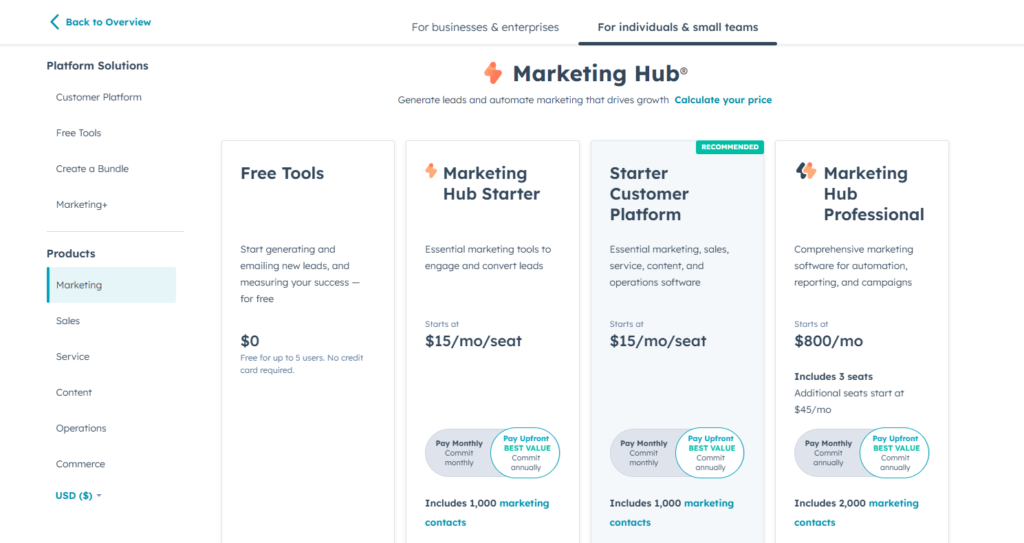
Key Features:
- Contact Management: Centralizes all customer information, making it easy to track communications and interactions.
- Sales Pipeline Management: Helps logistics companies manage deals and track progress through custom sales stages.
- Email Tracking and Automation: Automatically logs email interactions and allows for follow-up reminders, making customer communication more efficient.
- Task Automation: Automates routine tasks like follow-up emails, freeing up time for logistics teams to focus on operations.
- Reporting & Analytics: Provides insights into sales, customer behavior, and overall team performance, helping logistics companies optimize their processes.
Pricing:
- Free Plan: $0 for core features.
- Starter: $15/month (basic CRM and marketing features).
- Professional: $800/month (advanced automation, team management).
- Enterprise: $3,600/month (custom reporting, scalable for large teams).
HubSpot CRM is best suited for small to medium-sized logistics businesses that need a simple, scalable solution with strong customer management features and are looking to minimize initial costs. It’s perfect for companies that want to start with a free plan and gradually upgrade as they grow.
3. Salesforce
Salesforce CRM is one of the most powerful and customizable customer relationship management systems on the market, widely used across various industries, including logistics. Its extensive features, combined with high scalability, make it a go-to solution for businesses that require a comprehensive, flexible platform.
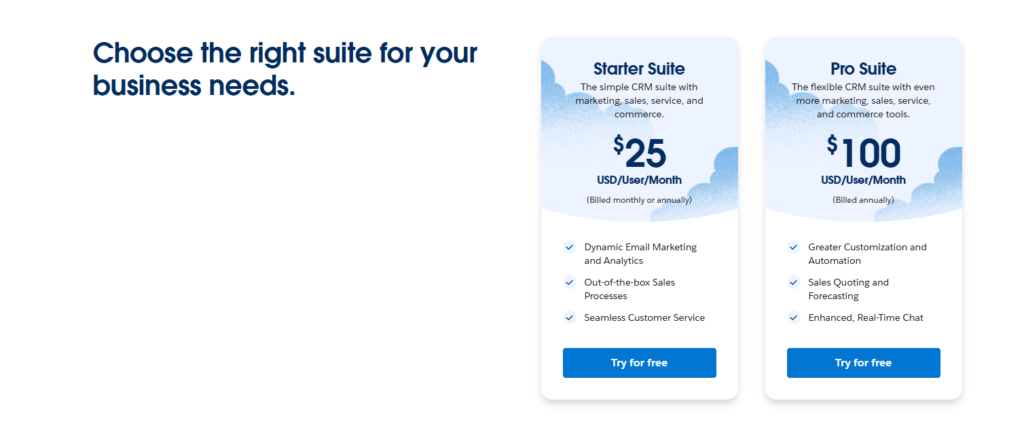
Key Features:
- Customizable Dashboards: Tailor the CRM to specific logistics workflows, offering insights into deliveries, customer interactions, and operational metrics.
- Automation Tools: Automates routine tasks such as invoicing, follow-ups, and shipment tracking, increasing efficiency in logistics operations.
- AI-Powered Analytics (Einstein Analytics): Provides predictive insights, allowing logistics companies to forecast demand and optimize routes and inventory.
- Integration Capabilities: Seamlessly integrates with third-party logistics tools, ERP systems, and popular platforms like Slack and Google Workspace.
- Mobile App: Allows real-time access to CRM data from anywhere, which is crucial for logistics teams on the move.
Pricing:
- Essentials: $25/user/month (basic CRM for small teams).
- Professional: $75/user/month (complete CRM for any size team).
- Enterprise: $150/user/month (advanced customization and automation).
- Unlimited: $300/user/month (unlimited CRM power and support).
Salesforce CRM is ideal for medium to large logistics companies that require advanced customization and scalable features to manage complex operations. It’s best for firms that need deep integration with other enterprise tools and advanced automation capabilities to streamline their logistics processes.
4. Pipedrive CRM
Pipedrive CRM is a sales-focused CRM designed to simplify pipeline management and sales processes. With its easy-to-use interface and emphasis on automation, Pipedrive helps logistics businesses streamline their sales workflows and track every deal, making it an excellent choice for sales-driven logistics companies.
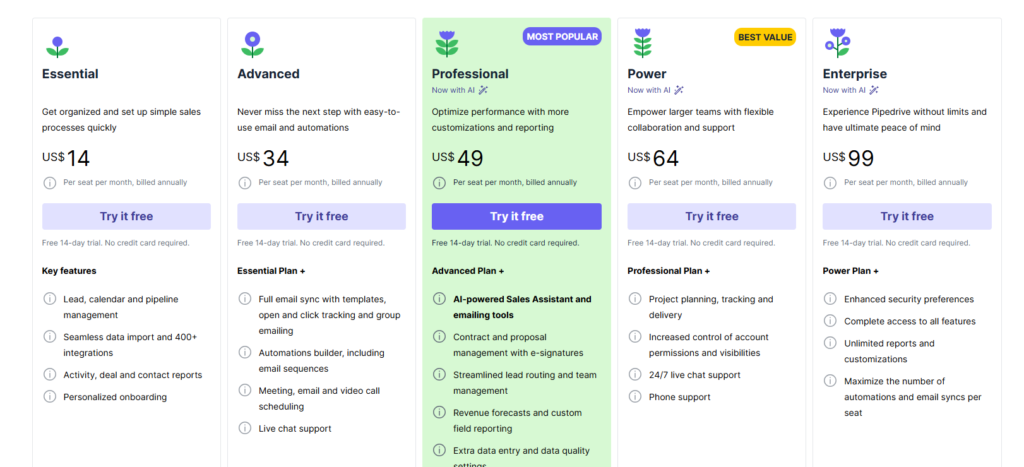
Key Features:
- Pipeline Management: Visualizes the sales process in a clear pipeline view, making it easy to track deals and optimize conversion rates.
- Sales Automation: Automates tasks like follow-up emails and activity reminders, allowing logistics teams to focus on customer interactions and service delivery.
- Lead Tracking: Helps logistics companies efficiently manage leads and opportunities, ensuring that no potential business is missed.
- Customizable Pipelines: Tailor the CRM to fit logistics-specific sales stages, making it easier to track freight contracts, shipping deals, and client agreements.
- Mobile Access: Supports teams on the move with real-time updates and deal management on mobile devices.
Pricing:
- Essential Plan: $14/month per user.
- Advanced Plan: $34/month per user.
- Professional Plan: $49/month per user.
- Power Plan: $64/month per user.
- Enterprise Plan: $99/month per user.
Pipedrive CRM is best suited for small to medium-sized logistics companies that are heavily focused on improving their sales processes. It’s ideal for businesses that prioritize tracking deals, managing sales pipelines, and need an intuitive, no-frills CRM with automation capabilities.
5. Zoho CRM
Zoho CRM is a highly versatile and affordable CRM solution, designed to help businesses of all sizes manage their customer interactions and workflows. With its wide array of features and affordable pricing, Zoho CRM is an excellent choice for logistics companies looking for a cost-effective yet comprehensive tool to manage operations and customer relationships.
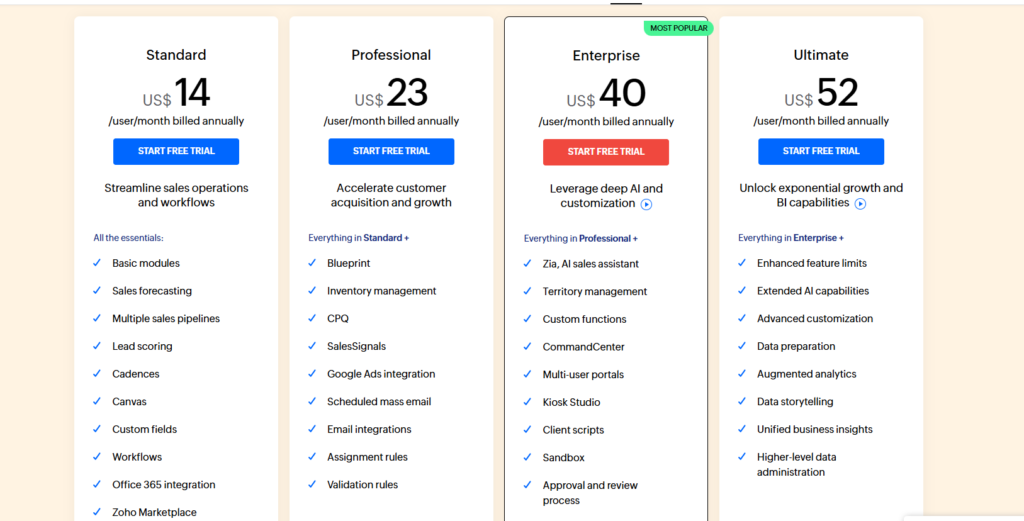
Key Features:
- Omnichannel Communication: Manage customer interactions via email, phone, social media, and live chat, enabling logistics companies to stay connected with clients across multiple channels.
- Workflow Automation: Automates repetitive tasks like scheduling deliveries, follow-up reminders, and invoice generation, reducing manual effort in logistics operations.
- Customizable Dashboards and Reports: Track metrics such as delivery times, customer satisfaction, and operational efficiency, providing logistics managers with actionable insights.
- Third-Party Integrations: Seamlessly integrates with various logistics tools like shipping and tracking software, accounting systems, and email marketing tools.
- AI Assistant (Zia): Provides predictive insights, helping logistics companies identify potential delays, optimize routes, and enhance customer service.
Pricing:
- Free Plan: Limited features for up to 3 users.
- Standard Plan: $14/user/month.
- Professional Plan: $23/user/month.
- Enterprise Plan: $40/user/month.
- Ultimate Plan: $52/user/month.
Zoho CRM is ideal for small to medium-sized logistics companies that need an affordable, flexible CRM solution with robust features. It’s particularly suited for businesses looking for comprehensive automation, customizable workflows, and omnichannel communication at a competitive price point.
6. Microsoft Dynamics 365 CRM
Microsoft Dynamics 365 CRM is a highly customizable and scalable platform designed for businesses of all sizes. With its seamless integration with other Microsoft products, this CRM is ideal for logistics companies looking for a comprehensive system to manage their customer relationships, operations, and supply chains, while benefiting from advanced analytics and automation features.
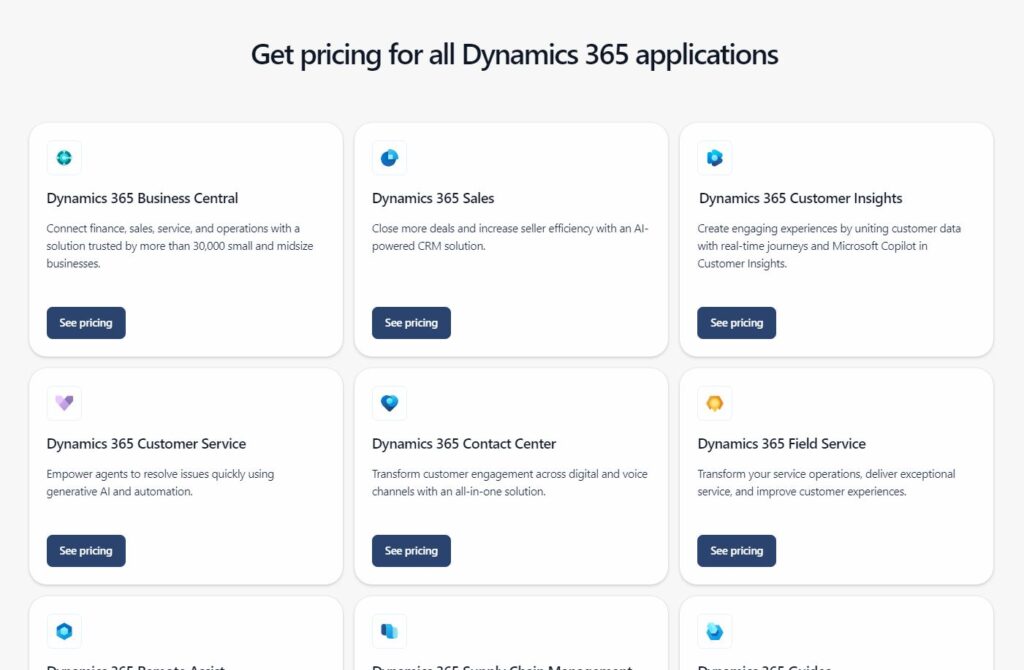
Key Features:
- Seamless Integration with Microsoft Products: Integrates effortlessly with Microsoft Office, Teams, and Azure, providing a unified platform for communication, data analysis, and collaboration within logistics operations.
- AI-Driven Insights: Leverages AI to provide predictive insights on customer behavior, inventory management, and demand forecasting, helping logistics companies optimize delivery routes and inventory levels.
- Workflow Automation: Automates routine tasks like scheduling, customer follow-ups, and invoicing, increasing operational efficiency for logistics teams.
- Customizable Dashboards and Reports: Allows logistics businesses to create customized reports to track key performance indicators (KPIs) such as delivery times, customer satisfaction, and supply chain efficiency.
- Multi-Channel Customer Engagement: Supports customer interactions across email, phone, social media, and more, helping logistics companies maintain strong client relationships.
Pricing:
- Customer Engagement Plan: Starts at $65/user/month for basic features.
- Sales Enterprise Plan: $95/user/month for advanced features and automation.
- Microsoft Relationship Sales: $162/user/month for enhanced analytics and LinkedIn Sales Navigator integration.
- Custom Plans: Available for large-scale enterprise needs.
Microsoft Dynamics 365 CRM is best suited for medium to large logistics companies or logistics reps managing complex operations that need deep integration with other Microsoft products. It’s ideal for businesses looking to leverage advanced AI tools, customizable workflows, and scalable solutions to manage their logistics, sales, and customer service processes comprehensively.
Which CRM is Best for Your Logistics Business?
While all the CRMs listed offer valuable features, HubSpot CRM, Salesforce CRM stands out as the best overall choice for the logistics industry. Its extensive customization options, powerful automation capabilities, and robust analytics make it an ideal solution for businesses looking to optimize their customer relationship management comprehensively.
- Small Logistics Firms: Zoho CRM or HubSpot CRM are excellent choices due to their affordability and ease of use.
- Medium to Large Logistics Companies: Salesforce CRM or Pipedrive offer the scalability and advanced features required to manage complex operations.
- Sales-Focused Logistics Businesses: Pipedrive is ideal for those prioritizing sales pipeline management and automation.
- Enterprise-Level Logistics Firms: SAP CRM provides the robust features and customization necessary for large-scale operations.
Next Steps
Now that you have a clear understanding of the top CRM solutions for the logistics industry, it’s time to take actionable steps:
- Identify Your Needs: Assess your business requirements and determine which CRM features are most critical for your operations.
- Start a Free Trial: Most CRM providers offer free trials or demo versions. Take advantage of these to explore the functionalities firsthand.
- Schedule a Demo: Reach out to CRM providers to schedule personalized demos, allowing you to see how the system can be tailored to your specific needs.
- Evaluate Pricing: Consider your budget and evaluate the pricing structures of each CRM to ensure it aligns with your financial plans.
- Make an Informed Decision: Based on your trials and evaluations, choose the CRM that best fits your business objectives and operational requirements.
How to Choose a CRM: A Beginner’s Buying Guide for Logistics Business
Selecting the right CRM can be overwhelming, especially for beginners. Here’s a step-by-step guide to help you navigate the process:
Identify Your Business Needs
Start by outlining your specific business requirements. Consider factors such as:
- Customer management
- Sales tracking
- Marketing automation
- Integration with existing tools
- Reporting and analytics
Evaluate CRM Features
Ensure the CRM offers features that align with your needs. Key features for logistics businesses include:
- Contact Management: Centralized database for customer information.
- Sales Automation: Streamlining sales processes and tracking leads.
- Workflow Automation: Automating routine tasks to enhance efficiency.
- Reporting & Analytics: Gaining insights into business performance.
- Integration Capabilities: Seamlessly connecting with other software tools you use.
Consider Ease of Use
A user-friendly interface ensures quick adoption by your team. Look for:
- Intuitive design
- Easy navigation
- Comprehensive training resources
Assess Scalability
Choose a CRM that can grow with your business. Consider:
- Ability to handle increasing data and user numbers
- Availability of scalable pricing plans
- Flexibility to add new features as needed
Review Pricing Structures
Evaluate the cost of each CRM, including:
- Subscription fees
- Additional costs for premium features or add-ons
- Total cost of ownership over time
Test Customer Support
Reliable customer support is crucial for resolving issues promptly. Check for:
- Availability of support channels (phone, email, chat)
- Quality of support services
- Availability of training and resources
Read Reviews and Testimonials
Gain insights from other users by reading reviews and testimonials. This can provide a realistic perspective on the CRM’s performance and reliability.
Make an Informed Decision
After thorough evaluation, choose the CRM that best fits your business needs, budget, and long-term goals.
Conclusion
Selecting the best CRM for the logistics industry is a strategic decision that can significantly impact your business’s efficiency, customer satisfaction, and growth. We explored key features to look for in a CRM, reviewed the top six CRM solutions tailored for logistics, and provided recommendations based on different business needs.
When choosing a CRM, consider your long-term business goals and ensure the system you select can scale with your growth. A well-chosen CRM not only streamlines your operations but also fosters stronger customer relationships, giving you a competitive edge in the logistics industry.
Ready to optimize your logistics business with the best CRM solutions? Explore Salesforce CRM, Zoho CRM, HubSpot CRM, Microsoft Dynamics 365, Pipedrive, and SAP CRM today and find the perfect fit for your business needs. Start your free trial or schedule a demo to experience the benefits firsthand.
FAQs
1. Do I really need a CRM?
Absolutely. A CRM system helps manage customer interactions, streamline processes, and enhance data management, leading to improved customer satisfaction and increased sales.
2. How secure is my data in a CRM?
Most reputable CRM providers implement robust security measures, including data encryption, secure access controls, and regular security audits, to protect your data.
3. Can a CRM integrate with my existing tools?
Yes, many CRMs offer integration capabilities with a wide range of third-party tools and software, ensuring seamless connectivity with your existing systems.
4. What is the cost of implementing a CRM system?
The cost varies depending on the CRM provider, the number of users, and the features you require. Most CRMs offer tiered pricing plans to accommodate different budgets and business sizes.
5. How long does it take to set up a CRM?
The setup time depends on the complexity of your requirements and the CRM system chosen. Generally, it can take anywhere from a few days to several weeks, including customization and training.
6. Can a CRM help with sales forecasting?
Yes, advanced CRMs offer sales forecasting tools that analyze data trends to predict future sales, helping you make informed business decisions.
7. Is training available for using the CRM?
Most CRM providers offer comprehensive training resources, including tutorials, webinars, and customer support to help you and your team get the most out of the system.
8. Can a CRM improve customer retention?
Yes, by providing personalized interactions, timely follow-ups, and insightful data, a CRM can significantly enhance customer satisfaction and retention.
9. What industries benefit the most from using a CRM?
While CRMs are versatile, industries that rely heavily on customer interactions and data management, such as logistics, sales, marketing, and customer service, benefit the most.
10. How often should I update my CRM?
Regular updates are essential to ensure the CRM remains effective and secure. Most providers release updates periodically, and it’s advisable to keep your system updated to leverage new features and security enhancements.
I’m Palash Pramanik, an SEO and CRM expert with a deep passion for helping businesses thrive online. I specialize in driving higher search engine rankings and creating seamless customer relationship management strategies to enhance both visibility and engagement. Whether you need to boost your online presence, attract the right audience, or streamline your client interactions, I offer tailored solutions designed to meet your specific needs. My goal is to help you optimize your digital strategy, strengthen customer connections, and drive sustainable growth. Let’s work together to elevate your business to new heights!

